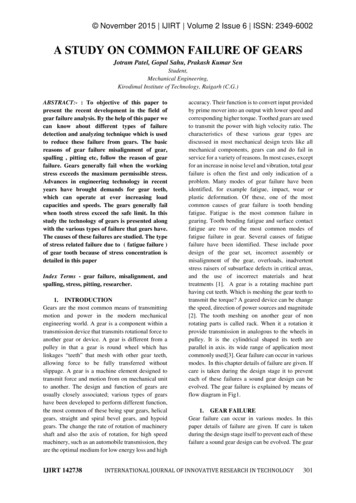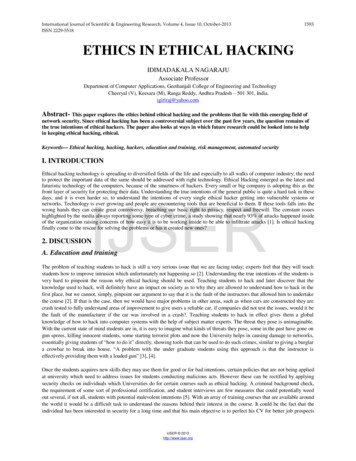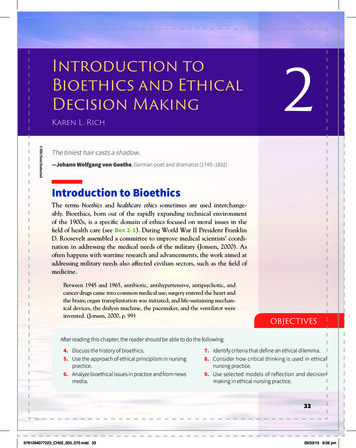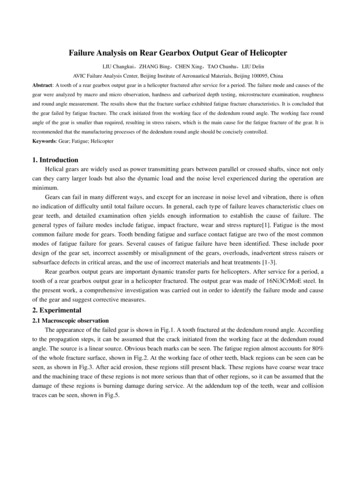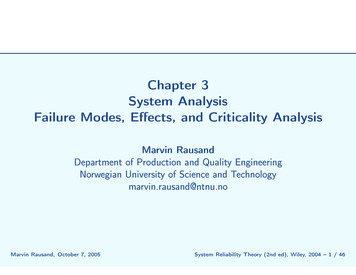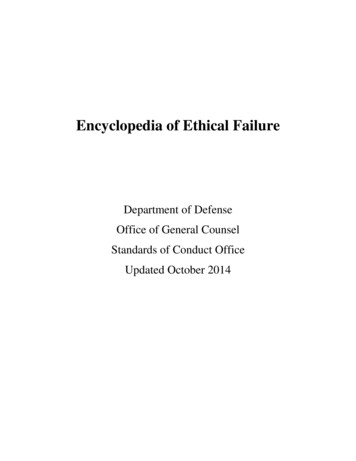
Transcription
Encyclopedia of Ethical FailureDepartment of DefenseOffice of General CounselStandards of Conduct OfficeUpdated October 2014
ContentsIntroduction . 3Disclaimer . 3Abuse of Position . 4Bribery (18 U.S.C. § 201-Type Violations) . 11Compensation for Representational Services from Non-Federal Sources(18 U.S.C. § 203-Type Violations) . 32Conflicts of Interest (18 U.S.C. § 208-Type Violations). 39Credit Card Abuse . 58Endorsements . 65Financial Disclosure Violations . 66Fraud (Violations Not Covered Elsewhere) . 72Gambling and Other Contest Violations . 83Gift Violations . 84Involvement in Claims Against the Government or in Matters Affecting the Government(18 U.S.C. § 205-Type Violations) . 89Misuse of Government Resources and Personnel . 92Morale, Welfare and Recreation (MWR) Issues . 119Political Activity Violations . 121Post-Employment Violations (18 U.S.C. § 207-Type Violations) . 132Salary for Government Work from Non-Government Source(18 U.S.C. § 209-Type Violations) . .146Time and Attendance Violations . 154Travel Violations . 1612
IntroductionThe Standards of Conduct Office of the Department of Defense GeneralCounsel’s Office has assembled the following selection of cases of ethical failure for useas a training tool. Our goal is to provide DoD personnel with real examples of Federalemployees who have intentionally or unwittingly violated the standards of conduct.Some cases are humorous, some sad, and all are real. Some will anger you as a Federalemployee and some will anger you as an American taxpayer.Please pay particular attention to the multiple jail and probation sentences, fines,employment terminations and other sanctions that were taken as a result of these ethicalfailures. Violations of many ethical standards involve criminal statutes. Protect yourselfand your employees by learning what you need to know and accessing your Agencyethics counselor if you become unsure of the proper course of conduct. Be sure to accessthem before you take action regarding the issue in question. Many of the cases displayedin this collection could have been avoided completely if the offender had taken thissimple precaution.The cases have been arranged according to offense for ease of access. Feel free toreproduce and use them as you like in your ethics training program. For example - youmay be conducting a training session regarding political activities. Feel free to copy andpaste a case or two into your slideshow or handout – or use them as examples ordiscussion problems. If you have a case you would like to make available for inclusionin a future update of this collection, please email it to OSD.SOCO@MAIL.MIL or youmay fax it to (703) 695-4970.DisclaimerThe Encyclopedia of Ethical Failure is intended to sensitize Federal employees tothe reach and impact of Federal ethics statutes and regulations. It is best used tosupplement personal verification of those statutes and regulations. It should not beinterpreted as a binding or authoritative presentation of the law.Note of Special ThanksWe thank the DoD OIG for their case contributions to the Encyclopedia.3
Abuse of PositionIf I Help You Land This Multimillion Dollar Contract, Will You GiveMe a Job?A former government human resource director was sentenced to two years ofprobation for violating conflicts of interest laws, 18 U.S.C. § 208, and lying on hisfinancial disclosure report. A whistleblower spilled the beans on a polling and marketresearch firm’s price inflation for government contracts and simultaneously its offer of asix-figure salary to the government official who was working to expand the firm’smultimillion dollar contract with his agency. The former official was criminallysentenced to two-years of probation for failing to notify ethics officials about hisemployment arrangement with the firm on his financial disclosure report. In a relatedcivil case, the former employee was barred from future government contracting work andforced to pay a 40,000 fine. Last but not least, the firm pulled his employment offerafter the news broke.General Discovers that Military Aides Are Not Supposed to Feed CatsMilitary officials discovered that a General was misusing Government personnel,improperly accepting gifts of services from subordinates, and misusing his position.What did he do? The General used his enlisted aides to help host unofficial functions athis headquarters, provide driving lessons to a family member, and to feed a friend’s cat.Although the aides were initially paid with 30- 40 Starbucks gift cards for theirservices, the General, taking full responsibility for his actions even though he retired,rectified the misuse and underpayment for services by retroactively paying the aidesalmost 2,000.Misadventures in Hiring FamilyTwo retired colonels working for a National Guard educational program werefound to have not been impartial in their duties when engaging in family hires. Colonel 1nicely asked Colonel 2 to authorize the hiring of Colonel 1’s son as a contractor whichColonel 2 did. Not to be outdone, Colonel 2 oversaw the hiring of his nephew and4
brother-in-law as contractors. Colonel 2 even attempted to get his own son hired as acontractor, but Colonel 2’s supervisor correctly thought it would be inappropriate. Eachcolonel was issued a letter of caution to avoid an appearance of a conflict and they wererequired to take an annual ethics training course.Chief AuthorityA military service Chief Master Sergeant abused her authority and improperlyused a government vehicle when she employed a government vehicle and three noncommissioned officers under her supervision to move personal property in a governmentrental vehicle. The soldiers helped her for 3 hours. The Chief Master Sergeant was givena verbal warning and advised of the improper use of government vehicles and the abuseof authority.Abuse of Position and BriberyA military service Captain used his official position as a reservist to obtaincontracts for private sector companies with which he had an affiliation. In addition, theCaptain accepted a “finder’s fee” (i.e., kickbacks) from one company for his efforts inhelping the company obtain government contract work. For his significant ethical failure,the Captain was “allowed” to retire at the grade of Commander, though he had beenselected to be an Admiral. In addition, the Captain was debarred for one year, while twoof the affiliated companies entered into administrative agreements (for 3 years) with themilitary service.Coercion by SupervisorThe director of a naval health clinic received a 3,000 loan from a subordinateafter requesting that the subordinate loan him 6,000. The 3,000 apparently wasn’tenough, however, and the director later asked for 10,000. This time the subordinatedeclined. After the director only repaid a fraction of the 3,000, the subordinateapproached the chain of command. In addition to being directed by his commandingofficer to repay the rest of the loan, the director was provided with a written letter ofcounseling regarding his unprofessional and unethical conduct.5
DoD GS-12 Removed for Misuse of AuthorityA GS-12 Recreation Program Manager who supervised approximately 75 civilianand military subordinates was removed from his position for several ethical violations,including the failure to avoid the appearance of impropriety. The employee moved intovisitors’ quarters on a military installation where he stayed for six months without payingfull price for his room by pressuring his subordinate to acquiesce to his paymentarrangements. He also authorized an employee to make a 400 agency expenditure topurchase workout clothing for one MWR fitness instructor. The employee had no reasonto believe he had the authority to authorize this expenditure and should have madeinquiry before giving authorization. The administrative law judge stated that this act“at the very least gives the appearance of impropriety and should have raised a red flag.”Business Costs EmployeeA former administrator for the Department of Health and Human Services tookseveral trips on the government’s dime that didn’t look good. The advisor informed theHHS Secretary that he intended to seek employment in the private sector. The Secretaryasked him to stay with the Department until Congress passed the new Medicareprescription drug benefits plan. The advisor agreed, but he continued to pursue his jobsearch while serving as a government employee. While there is nothing wrong withgovernment employees looking for a new job, the hang-up for this employee came whenhe decided to take several trips ostensibly related to his work for the HHS. While he wason these trips, he allegedly conducted “perfunctory meetings” for the HHS, and then hewent off to do what he had really come to do—to have interviews with potentialemployers. Regardless of whether or not these trips were set up for the purpose ofconducting bono fide government business, the advisor’s meetings with potentialemployers during those trips gave the appearance that he was using his position forpersonal gain The employee has agreed to reimburse the government’s costs for the trips,which totaled approximately 10,000 in value.6
Federal Agent Demoted for I.D.ing Herself as a Federal Agent to aPolice OfficerA Supervisory Special Agent for the Department of the Treasury (GS-14) was apassenger in a car that was pulled over by a local police officer. When the officerapproached the vehicle, the employee presented the officer with her credentialsidentifying herself as a Federal Agent. The police officer had not asked to see theemployee’s identification at all. Because law enforcement officials may be tempted totreat other law enforcement officials more favorably, the Department determined theemployee presented her government credentials to the police officer in hopes of receivingmore favorable treatment. The federal employee did not explicitly ask the police officerfor any favors, but the circumstances led her agency to the conclusion that she hadattempted to use her official position for personal gain, which is prohibited by federalethics rules. As a result, the employee’s agency determined that she was untrustworthyas a supervisor and she was demoted.Abuse of His PositionsA former ATF chief, Carl Truscott, was investigated by the Department ofTreasury Inspector General and found to have committed numerous ethics violations.Among them, Truscott was found to have misused his position and to have wastedgovernment resources by giving his nephew unlimited access to ATF employees andresources for a school project. The ATF’s Office of Public Affairs staff was told byTruscott to comply with all of his nephew’s requests. The OPA staff ended up “spoonfeeding” Truscott’s nephew. OPA staff spent numerous hours conducting research onpublicly available information, mailing the nephew hard copies, providing the nephewwith stock film footage, and conducting tours and interviews for the nephew. Truscottalso asked employees at the Philadelphia field office to escort his nephew on tours, and toperform demonstrations of canine drug detection for him. When Truscott’s nephewrequested to visit the ATF headquarters, Truscott allowed him to use ATF equipment,including the ATF’s film studio, cameras, and teleprompters to film interviews.Additionally, Truscott gave his nephew three personal interviews, including once at theconstruction site of the new ATF building where Truscott, his assistant, and an OPA staffmember had to travel to give the interview. Truscott also used his speechwriter to draft7
talking points for him to use in the interviews. And, as if that were not enough, after thenephew completed the video and received an “A” grade for it, Truscott continued toallow him to make requests to the ATF for suggestions on improving the video. Oneemployee reported spending four or five days complying with the nephew’s requests.The IG was unable to tally the total number of employees and hours that weredevoted to Truscott’s nephew, but estimated that at least 20 ATF employees wereinvolved. The IG determined that Truscott violated government regulations prohibitingfederal employees from using their office for private gain, wasting government resources,and influencing subordinates to waste government resources. (Office of the InspectorGeneral, Report of Investigation Concerning Alleged Mismanagement and Misconductby Carl J. Truscott, Former Director of the Bureau of Alcohol, Tobacco, Firearms andExplosives.SES Official’s Involvement with Subordinate Leads to RetirementThe Inspector General found that an SES official engaged in an intimaterelationship with a subordinate, provided her preferential treatment when selecting her fora new position, and misused Government resources and official time. The official retiredbefore the IG completed his report. The IG report indicated that the official’srelationship with a subordinate adversely affected the workplace, violated therequirements for members of the Senior Executive Service, and constituted conduct thatwas prejudicial to the Government. Witnesses noted that the official failed to hold hisparamour accountable for her professional responsibilities, and when confronted by otheremployees, became verbally abusing, vengeful, and angry. The official also served as theselecting official, who selected his subordinate for promotion, while engaged in anintimate relationship with her, thereby violating the Merit system principles and engagingin a prohibited personal practice.Affair with Assistant Leads to Employee RemovalA Deputy Assistant to the Secretary of Defense was terminated wheninvestigators discovered that he had engaged in a romantic relationship with a DoDcontractor who had served as his executive assistant. The executive assistant claimed thatthe end of their affair and the official’s subsequent persistence had led her to leave her8
position. When questioned by investigators regarding the affair, the Deputy Assistantinitially lied as to the nature of the relationship.Although charges of sexual harassment could not be substantiated, the InspectorGeneral found the Deputy Assistant’s behavior to be incompatible with the standards ofconduct established for DoD employees and members of the Senior Executive Service.The Office of the Secretary of Defense promptly initiated actions to terminate the DeputyAssistant.DEA Agent - Misuse of PositionA DEA agent whose responsibilities included fleet management and authorizationof repairs of Government vehicles had attempted to obtain free repair services for hispersonal vehicles from two vendors. The agent also insinuated to the vendors that thecost of repairing his personal vehicles could be recouped as part of the charges for repairsto Government vehicles. After these allegations were substantiated, the agent wasdismissed from DEA.Improper Use of PositionThe Department of Justice Office of Professional Responsibility (OPR)investigated allegations that a Department of Justice (DOJ) attorney prepared anotherperson's application for a visa with a cover memorandum on DOJ stationery. The DOJattorney also included one of his DOJ business cards in the submission. The foreignindividual was seeking a visa in order to enter the country to perform certain functionsfor a non-profit organization. The DOJ attorney told OPR that he did not intend to gainpreferential treatment for the visa applicant by identifying himself as a DOJ attorney, butbelieved his actions were consistent with what DOJ employees are permitted to do onbehalf of non-profit organizations.OPR concluded that the actions of the DOJ attorney were improper, but notintentionally so. Section 2635.703 of the Standards of Ethical Conduct for Employees ofthe Executive Branch prohibits employees from using their position or title for purposesof endorsement.9
“You obviously don't know who I am.”The son of a bureau director was denied a rental car because he was too young.Outraged, his father wrote a scathing letter (on Agency letterhead) to the president of therental car company, and sent it off in a U.S. postage-paid envelope. The president of thecompany was not amused and returned his scathing response to the head of the Agency.As a result of his action, the Bureau Director was treated to a four-hour ethics session anda fine for personal use of official postage."But, Judge, I didn't get anything!"An offshore safety inspector found much of the Government’s equipment to be inneed of repairs to meet safety standards. He then referred the business to his brother-inlaw's repair shop. The rig operators smelled a rat and called the FBI. They discoveredthat, in return for each referral, the brother-in-law was treating the inspector to an eveningwith a lady of dubious morals.The case was brought to trial. In his defense, the inspector claimed that he hadnot received a "thing of value" in return for the referral. The judge didn't buy it - andneither did his wife.Use of Contractor TimeAllegations were made against a Department of Defense (DoD) official regardinghis use of contractor employees. The official directed two US Government contractors toentertain an acquaintance he met at a conference in Europe on his behalf. They weredirected to take the person out to lunch as well as out on the town the following evening.The contractors rightly believed that the request was improper and as a result told theDoD official that they “had other plans.” The DoD official told them to “cancel them.”The contractors eventually took the acquaintance out that evening for several hours.After an investigation, it was determined that the DoD official had acted inviolation of 5 CFR 2635.704 by utilizing contractors’ time improperly. His supervisorcounseled him and the proper reimbursements were made.10
Veterans Affairs Supervisors Push for Friends to be HiredA review found in two instances that Department of Veterans Affairs medicalcenter supervisors recommended the hiring of close personal friends without divulgingthe relationship to human resources staff members. The review team recommended thatdisciplinary action be taken.Interior Official Altered Reports and Leaked Confidential InformationThe Interior Department’s Inspector General found that a senior official hadrepeatedly altered scientific field reports to lessen the protections for imperiled speciesand ease the impact on landowners. The investigation also revealed the official, whoworks in Fish and Wildlife Services, misused her position by disclosing confidentialinformation to private groups seeking to affect policy decisions. The Inspector Generalreferred the case to the Department Head for “potential administrative action.”(The Seattle Times, March 30, 2007)Bribery (18 U.S.C. § 201-Type Violations)My Oath of Office for Your Cold Hard CashA U.S. Foreign Service officer, who worked in the U.S. Consulate in Ho ChiMinh City, Vietnam, was responsible for issuing visas after reviewing applications andconducting interviews. He conspired with U.S. and Vietnamese citizens to recruitcustomers who would pay 15,000 to 70,000 in exchange for non-immigrant visas fromVietnam to the U.S. He accepted over 3 million in bribes and allowed nearly 500foreign nationals to enter the U.S. He pleaded guilty to bribery and agreed to pay at least 6 million in a money judgment and faces up to 24 years in prison.The GodfatherA former Department of Defense employee used to refer to himself as “TheGodfather” because of his ability to influence the awarding of construction contracts.However, like all great crime bosses, this employee was arrested for extorting a 10,000bribe. The Godfather accepted a 10,000 installment of a 40,000 bribe from an11
undercover agent in an attempt to secure a flooring contract. The Godfather was takeninto custody.Lucrative ContractingA former Army officer had found a lucrative gig: accepting cash payments forfacilitating contracting between Iraqis and the U.S. government during a deployment toBaghdad. This particular officer accepted 37,500 in cash payment for these“facilitations.” The officer was sentenced to prison, three years of supervised release,and was required to pay 37,500 restitution to the U.S. Government.Bribe for a BulldozerA retired military employee plead guilty to taking bribes in exchange for turning a blindeye while others stole heavy equipment from the base for resale. The man admitted to allowingitems such as cranes, bulldozers, and front-end loaders to be taken from the base. As part of hisplea agreement, the employee agreed to forfeit the bribe proceeds, as well as to pay full restitutionto the Department of Defense.Fraud, Conspiracy, and Bribery Oh My!Criminal charges put a computer contractor out of business and landedgovernment employees in jail. Two civilian employees at a Military Depot, along withthe contractor’s government sales manager, were convicted on various conspiracy andbribery charges for defrauding the U.S. Government under multiple contracts in return forcash and merchandise. The employees were part of a scheme in which they usedgovernment funds to purchase laptops and recycled computer components from thecontractor’s sales manager at inflated prices, and split the overcharged amounts amongthemselves. One employee received prison time, three years probation, and was orderedto pay 30,000 in restitution. The other employee was sentenced to 22 months in jail,three years of probation, and ordered to pay 18,000. The sales manager received asimilar sentence. The computer contractor was indicted on nine felony counts andsubjected to asset forfeiture of approximately 7.8 million. The charges were laterwithdrawn after the company filed for bankruptcy. The investigation also resulted12
in five other individuals charged with prison time and ordered to pay a combined 127,000 in restitution.One Thing Leads to AnotherA misuse of government resources investigation hit unexpected pay dirt when ituncovered a contractor procurement and bribery scheme. Investigators responding to ahotline tip substantiated a misuse of funds claim when they found a civilian utilitiesmanager at a Military command rented a 350-ton crane to move electrical generatorsseven days before it was needed; costing the government 35,000. The investigation alsouncovered a complicated contract bid rigging, bribery and kickback operation involvingthe utilities manager and a Service contractor. The manager manipulated and solesourced work to the contractor; reportedly to drive business to the contractor in order totransition to a job with them after his government job. The manager used governmentfunds to purchase expensive tools, plasma TVs, and laptop computers that turned upmissing. He also allowed the contractor to use government personnel, tools, andequipment to do the contractor’s work. He submitted false invoices on behalf of thecontractor, resulting in a 1.3 million loss to the government. As a result of a plea dealfor cooperation in additional procurement investigations, the manager was sentenced to15 months in prison and debarred from government contracting for four years. Thisinvestigation touched off five separate criminal investigations against other contractors inthat Military Service regarding allegations of bid rigging.Bribery and Fraud Lands Program Manager in JailA Program Manager (PM) that was responsible for administering computercontracts received kickbacks and ran his own business defrauding the Government. ThePM negotiated a deal with a contractor that raised the price of computer storageequipment by 500 a unit. The increase was for “additional services” that weresupposedly needed to resolve a defect in the equipment. An investigation determined thatthese services were unnecessary, and that the 500 was paid to a shell company owned bythe PM’s wife.The 500 per unit was just the start. He also used a business that he controlled topurchase generic equipment and resell it to the Government as a name brand product far13
above market rate. These endeavors proved to be quite lucrative, and the PM profitedabout 3.2 million on the schemes. The profit was short-lived, however, as the PM wasindicted for bribery and fraud. He was sentenced to five years in prison, required torepay the 3.2 million and charged a 2,400 fine.Contracting Official in Afghanistan Pleads Guilty to BriberyA Government employee at Bagram Airfield, pled guilty to accepting bribes inexchange for awarding Government contracts. The employee was responsible forevaluating trucking contractors and assigning each contractor days of work each monthbased on their performance. The employee was approached by a contractor andultimately accepted a wireless telephone and 20,000 a month in exchange for assigningan extra day of work each month to that contractor. He also made a similar deal withanother contractor for 15,000 a month. In all, the employee received about 87,000. Hewas sentenced to forty months in prison and three years of supervised release.Major WrongdoingA retired Army Major, Christopher H. Murray, pled guilty to charges of briberyand making a false statement arising from his activities at Camp Arifjan, Kuwait.In 2005 and 2006, while serving as a contracting specialist at Camp Arijan,Murray received approximately 225,000 in bribes from DOD contractors. In return, herecommended the award of contracts for various goods and services. Murray alsoadmitted that he received an additional 20,000 in bribes from a DOD contractor inexchange for the award of a construction contract. Murray’s misconduct continued as hemade false statements to federal agents investigating his conduct. Murray’s sentencing ispending, but the maximum penalty for each of four bribery counts is 15 years in prisonand a 250,000 fine. The maximum penalty for making a false statement is five years inprison and a 250,000 fine.In another bribery case at Camp Arifjan, another Army Major, James Momon, Jr.,accepted cash bribes from five DOD contracting firms that supplied bottled water andother goods and services to bases in Kuwait. Momon, a contracting officer at the camp,awarded contracts and Blanket Purchase Agreement calls to those contractors, receiving14
5.8 million as payment for his actions. Momon pled guilty to bribery and conspiracy tocommit bribery. His sentencing is pending, but, like Murray, Momon faces up to 15years in prison and a 250,000 fine for each bribery count, as well as five years in prisonfor the conspiracy count. Momon has also agreed to pay 5.8 million in restitution.Inhibiting VictoryA Major in the U.S. Army Reserve pled guilty to conspiracy and bribery chargesrelated to DOD contracts at Camp Victory, Iraq. According to the charging document,Theresa Jeanne Baker received money and other items, including a Harley Davidsonmotorcycle, from a defense contractor, Raman Corporation, and a former employee ofanother defense contractor, Elie Samir Chidiac. In return, Baker conveyed sensitiveinformation and fraudulently awarded contracts to the contractor. Baker also canceledcontracts that were awarded to third party contractors and fraudulently re-awarded themto Chidiac. Baker’s sentencing is pending, but the maximum penalty for each of Baker’stwo bribery counts is 15 years in prison and the greater of a 250,000 fine and three timesthe monetary equivalent of the thing of value received. Baker was also charged with twocounts of conspiracy. Each count comes with a maximum penalty of five years in prisonand a 250,000 fine.Courting TroubleA former official of the U.S. Tax Court, Fred Fernando Timbol Jr., was sentencedto 18 months in prison and three years of supervised release in connection with a briberyconspiracy.Timbol was a facilities services officer in the Facilities Management Section ofthe U.S. Tax Court. Timbol was responsible for assisting in the award of contracts tocontractors who provided maintenance, construction, and other related service to theCourt. Timbol admitted to soliciting and accepting over 12,000 from a governmentcontractor in exchange for rigging the award of at lea
The Encyclopedia of Ethical Failure is intended to sensitize Federal employees to the reach and impact of Federal ethics statutes and regulations. It is best used to supplement personal verification of those statutes and regulations. It should not be interpreted as a binding or auth



